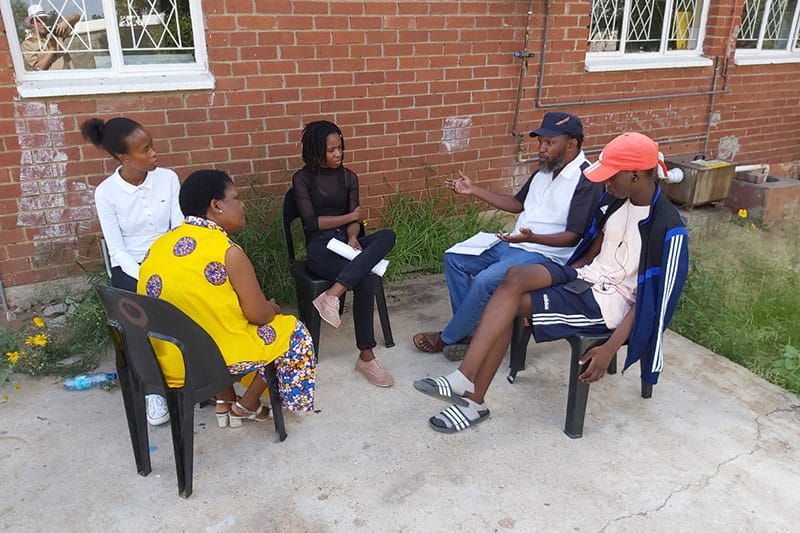Self- and Mutual Help Groups

Self Help
In recent years, per capita alcohol consumption in Africa has increased at a distressing rate. This has devastating effects on social coexistence and people’s health. There is a lack of preventive measures in the countries and there is an absence of therapeutic options for problematic consumer or even addictive behaviour. People with addiction find themselves on the fringes of society. They often live apart from their families, have lost their circle of friends and hardly receive any medical or psychological support. Especially in developing countries, where people with addiction can barely expect structural help, participation in meetings of self-help groups is often the only way to find a way out of addiction. Studies on the self-help concept showed that without additional therapeutic measures, the living situation stabilized significantly in 20-25% of the participants.
IBC is committed to seeing self-help groups as fundamental to the treatment of addictive diseases. That is why the establishment of self-help groups has become an important part of our activities in Africa. We understand the self-help concept as one of the simplest and most effective instruments in supporting people to leave their addictive behaviour behind. Self-help should not be a substitute for therapy, but it is an important accompanying measure, and in many cases the only measure available in addiction treatment.
Intervention Strategy
IBC has developed a concept for planning and implementing self-help activities. It is based on the self-help instrument of the WHO (Quality Rights self-help recovery tool), which the WHO recommends for the therapy of mental problems and addictions as part of its universal health care goal (UHC). This self-help strategy (individual as well as group-based) is based on several different exercises that serve for self-reflection and aid those affected by addiction to achieve a better self-image and establish a way to recovery.
The self-help programme is based on the 12-Step Compass [dt. 12-step programme]. This programme consists of principles that show those affected how to face the problems resulting from their addiction, how to get better in the face of these problems and how to continue their lives when fully recovered. In addition, space is created in the groups to pray and meditate. Each group consists of at least five participants.
The IBC concept developed from this is adapted for use within the African Blue Cross member organizations. They are trained and then supported in establishing self-help groups. Groups are currently active in Nigeria, Botswana, Ghana, Burkina Faso, Uganda, Kenya, Madgascar and the Republic of Chad.
Programme Specifics
First, the IBC member organisations identify coordinators to take part in the self-help training. These online trainings are carried out by IBC employees on a monthly basis. Depending on the level of knowledge and needs of the participants, additional individual coaching is offered. After the coordinators have successfully completed the training, they start to set up self-help groups or work with existing groups. Each group operates autonomously. The meetings are structured in such a way that all participants can have their say and share their problems and experiences, without being “forced to speak”. Mutual respect, appreciation and confidentiality are guiding principles in structuring group conversations. The goal for each individual affected is an abstinence lifestyle. Self-help groups are being set up in those countries where people are most affected by addictive diseases.
In addition to holding self-help meetings, the local population is educated about the need for inclusion and care for addicts. To this end, the IBC member organisations work together with social multipliers such as police officers, doctors, communal and religious leaders. They are made aware of alcohol and drug addiction as a disease and learn that stigmatisation and marginalisation of addicts is not effective. These actors then get involved in their reference groups to support people with addictions and increase their participation in self-help groups. In their social and professional environment, they are committed to promoting inclusion and social support whilst also creating a better social climate.
Regular participation in meetings of self-help groups should be made possible in the relevant programme countries for all those who suffer from addictive diseases. The groups consist of four to a maximum of twenty participants. They are guided by trained volunteers and / or former addicts and carried out on an informal and charitable basis.
Success Stories
Your content goes here. Edit or remove this text inline or in the module Content settings. You can also style every aspect of this content in the module Design settings and even apply custom CSS to this text in the module Advanced settings.
